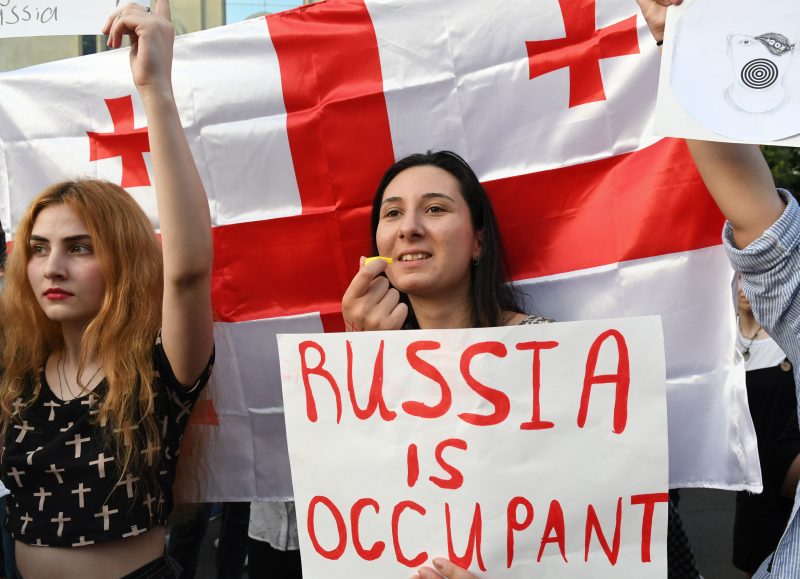Russia bans Georgia airline flights as tensions rise over protests
President Vladimir Putin signed a decree banning Russian airlines from flying to Georgia from July 8 in response to anti-Moscow rallies in the ex-Soviet neighbour (Vano SHLAMOV)
Moscow (AFP) – Russia’s government on Saturday banned Georgian airlines from flying into its territory, extending restrictions imposed by President Vladimir Putin as part of growing tensions between Moscow and its ex-Soviet neighbour.
Putin had signed a decree late Friday banning Russian airlines from flying to pro-Western Georgia from July 8 in response to anti-Moscow rallies in the Georgian capital Tbilisi.
The protests broke out after a Russian lawmaker addressed parliament from the speaker’s seat earlier this week, a hugely sensitive move for two countries whose relations remain tense after a brief war in 2008.
The rallies have morphed into a broader movement against the Georgian authorities while the Kremlin has branded them a “Russophobic provocation”.
On Saturday, protesters took to the streets of the Georgian capital for a third day of rallies, with some 3,000 demanding snap elections and electoral reform.
The crowd sang a profanity-laced, anti-Putin chant and some of the demonstrators held up placards insulting the Russian president.
Demonstrators also shot paper airplanes into the sky in response to the Russian bans.
Russia’s transportation ministry said that from July 8 two Georgian airlines would be banned from flying to Russia, citing the need to ensure “aviation safety” and debt owned by the Georgian companies.
The Kremlin has said the ban against travel to Georgia was to “ensure Russia’s national security and protect Russian nationals from criminal and other unlawful activities.”
Authorities recommended travel companies stop selling holiday packages to Georgia and advised Russian tourists to return home.
Russia’s travel industry and ordinary Russians hit out at the decision by the Kremlin, saying it was a politically motivated move that has little to do with safety concerns.
“Tourism in Georgia is on the rise, and the decision has shocked the whole industry,” Aleksan Mkrtchyan, head of Pink Elephant, a chain of travel agencies, said in a statement.
– ‘This is politics’ –
The ban during high season is expected to hit the travel industry in both countries hard and become a major nuisance for Russian holidaymakers.
Russia and Georgia fought a brief but bloody war in 2008 and tensions between the two governments remain high.
But Georgia — known for its picturesque Black Sea resorts, rich national cuisine and generous hospitality — has emerged as one of the most popular destinations for Russian tourists over the past few years, with more than 1.3 million visiting last year.
Irina Tyurina, a spokeswoman for the Russian Tourism Union, said that most in the industry believed that Georgia was not a dangerous destination.
“Georgians have traditionally treated Russians well,” Tyurina told AFP.
It was too early to estimate potential industry losses from the ban, she said.
More than 7,000 people have signed a petition calling on Moscow to resume flights.
Russian tourists in Tbilisi expressed regret at the restrictions.
“We are against the ban,” Nina Guseva told AFP in the Georgian capital. “We are not guilty and we do not have to suffer.”
Fellow traveller Mikhail Strelkov added: “This is politics and has nothing to do with people on holidays.”
In Russia, many struck a similar note.
Elena Chekalova, a prominent chef and culinary blogger, said the latest Kremlin move “shocked” her.
“Why are they deciding for us what we cannot eat, where we cannot fly, who we cannot be friends with?” she wrote on Facebook.
– Simmering discontent –
Moscow has suspended flights to Georgia before — during a spike in tensions in October 2006 and in August 2008 following the outbreak of the five-day war over the breakaway regions of Abkhazia and South Ossetia.
“Putin decided to punish Georgia because there are street protests there,” opposition leader Alexei Navalny said on Twitter.
A senior government official in Tbilisi said the Kremlin ban was politically motivated.
“Putin’s decision is of course political and has nothing to do with safety concerns,” the official told AFP on condition of anonymity.
Analysts say the latest restrictions may further fuel simmering discontent with Kremlin policies.
Since 2014, Russians have been chafing under numerous rounds of Western sanctions over Moscow’s role in Ukraine and other crises, with real incomes falling for the fifth year in a row.
During an annual phone-in with Russians this week, Putin dismissed calls to “reconcile” with the West to alleviate economic hardship, saying Moscow needed to protect its interests and “nothing” would change anyway.
Disclaimer: Validity of the above story is for 7 Days from original date of publishing. Source: AFP.


